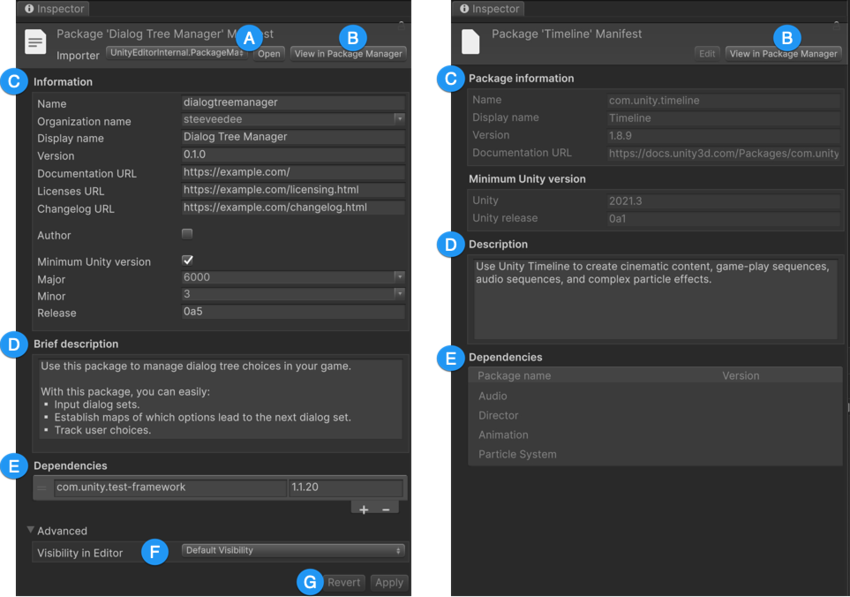Package Manifest window reference
To view or edit a package manifestEach package has a manifest, which provides information about the package to the Package Manager. The manifest contains information such as the name of the package, its version, a description for users, dependencies on other packages (if any), and other details. More info
See in Glossary, select the package.json file from a Packages subfolder in the Project window. The Unity Editor displays the manifest’s contents in a dedicated InspectorA Unity window that displays information about the currently selected GameObject, asset or project settings, allowing you to inspect and edit the values. More info
See in Glossary window.
Starting with Unity 6.3, you can also access this dedicated Inspector window from within the Package Manager window. For more information, refer to preview the package manifest.
This window displays read-only fields if the package is immutableYou cannot change the contents of an immutable (read-only) package. This is the opposite of mutable. Most packages are immutable, including packages downloaded from the package registry or by Git URL.
See in Glossary, such as a package you installed from a registry, as a tarball, or from a Git URL. The fields are editable if the package is mutableYou can change the contents of a mutable package. This is the opposite of immutable. Only Local packages and Embedded packages are mutable.
See in Glossary, such as a package you’re developing locally, or a package you copied into the Packages folder of your project.

(A) You can select Importer, Edit, or Open when the package is mutable. Select Edit to make the read-only fields editable. Select Open if you prefer to load this package manifest in your default script editor.
- The Edit button appears when you access a mutable package from the Package Manager window then change to the Inspector window.
- The Open button appears when you select Edit or access the a mutable package’s
package.jsonfile from the Project window. Access this file by opening it in your file management application or by selecting Locate in the Package Manager window. - To view the JSON directly within the Inspector window, open the Importer menu and select UnityEditor.TextScriptImporter.
(B) Select View in Package Manager to open the Package Manager window and load this package in its details panel.
(C) The Information section has details about this specific package version.
(D) The Brief description text box shows the description field of the manifest. This text also appears in the details panel of the Package Manager window. For more information, refer to the documentation for the description property.
(E) The Dependencies section shows the list of packages that this package depends on. Refer to Dependencies for information about how to manage the dependencies of a package you’re editing.
(F) If the package is mutable, Visibility in Editor determines whether the Project window hides the package’s assets and omits them from the results when you use the Object Picker in the Inspector window. This field maps to the hideInEditor property of the package manifest file (package.json).
(G) If the package is mutable and you made changes, select Revert to discard the changes. Select Apply to save any changes you have made to the manifest.
Information section
| Property | Description |
|---|---|
| Name | A substring of the package’s technical (or official) name. This field maps to the name property of the package manifest file (package.json) with the leading identifiers removed. |
| Organization name | The identifier of the Unity Organization that created this package. |
| Display name | The user-facing name on display in the Project window and the Package Manager window. This field maps to the displayName property of the package manifest file (package.json). |
| Version | The package version number. For more information, refer to the documentation for the version property. |
| Minimum Unity version | For mutable packages, you can enable this option to specify the lowest Unity version this package is compatible with. When you enable this option, the Major, Minor, and Release properties appear. If this package is compatible with all Unity versions, clear this checkbox and remove the Major, Minor, and Release properties. For more information, refer to the documentation for the unity property. |
| Major | Specify the MAJOR part of the minimum Unity version. For more information, refer to the documentation for the unity property. |
| Minor | Specify the MINOR part of the minimum Unity version. For more information, refer to the documentation for the unity property. |
| Release | Specify the UPDATE and RELEASE part of the minimum Unity version. For more information, refer to the documentation for the unityRelease property. |
Depending on the window’s state (editable or read-only), additional information displays for optional properties, such as Documentation URL, Licenses URL, Changelog URL, and Author.
Dependencies section
Lists the other packages that are dependencies for this package. Each entry consists of the technical name for the package (for example, com.unity.probuilder) and its version number.
If you’re viewing a mutable package, you can add a dependency by following these steps:
- Select the Add (+) button. A new row appears in the list.
- Enter the package name on the left and the version on the right. For more information, refer to the documentation for the dependencies property.
If you’re viewing a mutable package, you can remove a dependency by following these steps:
- Click the selector
 to the left of the package you want to remove.
to the left of the package you want to remove. - Select the Remove (−) button. The row disappears from the list.